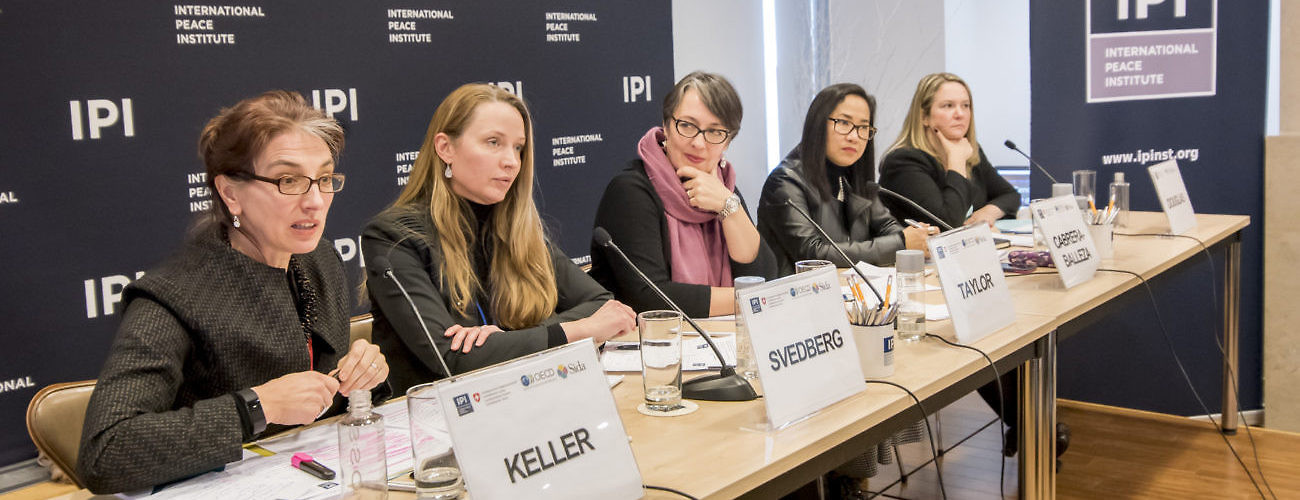Development programs tend to include women affected by conflict and violence as passive beneficiaries, rather than as active agents in strengthening gender equality, peacebuilding, and sustainable development. And where development partners do support women’s agency in strengthening recovery and reconciliation in rural areas, they often fail to link these activities to wider processes of women’s mobilization, peacebuilding, and statebuilding.
Confronting that reality requires looking at women as “actors rather than only as passive victims,” said Ursula Keller, chair of the Organization for Cooperation and Development (OECD) Development Assistance Committee Network on Gender Equality (GENDERNET). It requires focusing “very strongly on women’s participation, but really meaningful participation: not just counting women but making women count,” she said.
Ms. Keller was speaking to a March 14th policy forum at IPI on Gender Equality and Women’s Empowerment in Fragile and Conflict-Affected Situations, cosponsored by IPI, GENDERNET, and the Governments of Sweden and Switzerland.
In introductory remarks, Deqa Yasin Hagi Yusuf, Somalia’s Minister of Gender and Human Rights Development, said that during the recent conflict in her country “women provided the backbone of our economy” and that now that the conflict is largely over, “gender equality is a central objective for sustaining peace and development in our current national development plan.” Among the “significant strides” she reported were that women occupy 24% of the seats in the two houses of Parliament, an inclusive human rights commission has been formed with four women among the nine commissioners, and the country’s first legislation on sexual offenses has been developed under the leadership of her ministry.
Ms. Keller reported the findings of a new OECD policy report into how donors can provide these gender equality projects with support that is both qualitatively and quantitatively better. Gender roles and inequality can often be a driver in conflict, she said, naming societal expectations of masculinity as a cause for violence. Programming that considers gender-sensitive pathways can best tackle fragility as “conflict and fragility places enormous burdens on women’s rights,” she said. She also noted that “women’s active participation in peacebuilding and statebuilding can actually contribute to peace and resilience.”
Barbro Svedberg, Policy Specialist for Women, Peace, and Security at the Swedish Development Cooperation Agency (Sida) said that women, peace, and security resolutions had been paramount to a collective understanding of “women as drivers of positive peace,” and had had an enormous impact on Swedish “feminist” foreign policy over the last year.
Sida considers the interlinkage of gender equality, conflict sensitivity, and human rights, as “key elements in all of our programming,” said Ms. Svedberg, adding that “gender equality, for Sida, is a prerequisite for peace.” Describing Sida’s two new strategies, she said “The first, gender equality, should inform the other, [peacebuilding and statebuilding].”
Mavic Cabrera-Balleza, International Coordinator of the Global Network of Women Peacebuilders, reiterated the significance of this interlinkage, highlighting that “gender inequality, conflict, and fragility are all parts of the same equation. Each one cannot be isolated from the other two.” She also acknowledged that “gender inequality is one of the drivers of conflict.”
Considering conflict and fragility as functions of gender inequality rather than inequality as a consequence of conflict, Ms. Cabrera-Balleza urged institutional supporters to offer sustainable and not project-based donations. “Sustainable peace is not a project,” she said, “it is a way of life and it should be part of our global culture.”
Sarah Douglas, Deputy Chief of Peace and Security of UN Women, said that the women’s empowerment aspect of the Sustainable Development Goals creates an effective framework that shifts thinking from technical to political approaches and “challenges us…to use political analysis when we’re thinking about development and peacebuilding in the aftermath of conflict.”
Ms. Douglas conceded that UN analysis of conflict usually focused more on women’s oppression than their “capacities for peace,” and argued, “that’s what a gender perspective can also bring.”
Because deliberation at United Nations headquarters can reflect a strikingly different vision of conflict than the reality on the ground, she emphasized the need that conversation at headquarters reflect the lived experience of “women on the ground in a much more authentic way.”
Referring to the importance of “breaking down silos” and adopting a more holistic approach to policy making, Ms. Douglas concluded that policy must consider, “Who are the women’s organizations at the grassroots level who are actually holding the fabric of society together and how can they be mobilized, supported, encouraged, have doors open to them to really be able to expand their work and ensure sustainability?”
IPI Research Fellow Sarah Taylor was the moderator.








